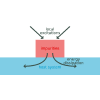Prerelaxation in quantum, classical, and quantum-classical two-impurity models
引用次数: 0
Abstract
We numerically study the relaxation dynamics of impurity-host systems, focusing on the presence of long-lived metastable states in the nonequilibrium dynamics after an initial excitation of the impurities. In generic systems, an excited impurity coupled to a large bath at zero temperature is expected to relax and approach its ground state over time. However, certain exceptional cases exhibit metastability, where the system remains in an excited state on timescales largely exceeding the typical relaxation time. We study this phenomenon for three prototypical impurity models: a tight-binding quantum model of independent spinless fermions on a lattice with two stub impurities, a classical-spin Heisenberg model with two weakly coupled classical impurity spins, and a tight-binding quantum model of independent electrons with two classical impurity spins. Through numerical integration of the fundamental equations of motion, we find that all three models exhibit similar qualitative behavior: complete relaxation for nearest-neighbor impurities and incomplete or strongly delayed relaxation for next-nearest-neighbor impurities. The underlying mechanisms leading to this behavior differ between models and include impurity-induced bound states, emergent approximately conserved local observables, and exact cancellation of local and nonlocal dissipation effects.

量子、经典和量子-经典双纯度模型中的先验性
我们用数值方法研究了杂质宿主系统的弛豫动力学,重点研究了杂质初始激发后非平衡态动力学中存在的长寿命可迁移态。在一般系统中,与零温大浴耦合的受激杂质会随着时间的推移而松弛并接近其基态。然而,在某些特殊情况下,系统会表现出可陨落性,即在大大超过典型弛豫时间的时间尺度上仍处于激发态。我们研究了三种典型杂质模型的这种现象:晶格上独立无自旋费米子与两个存根杂质的紧密结合量子模型、两个弱耦合经典杂质自旋的经典自旋海森堡模型,以及独立电子与两个经典杂质自旋的紧密结合量子模型。通过对基本运动方程的数值积分,我们发现这三个模型都表现出相似的定性行为:最近邻杂质完全弛豫,而最近邻杂质弛豫不完全或强烈延迟。导致这种行为的基本机制因模型而异,包括杂质诱导的束缚态、出现的近似守恒的局部观测值以及局部和非局部耗散效应的精确抵消。
本文章由计算机程序翻译,如有差异,请以英文原文为准。
求助全文
约1分钟内获得全文
求助全文

 求助内容:
求助内容: 应助结果提醒方式:
应助结果提醒方式:


